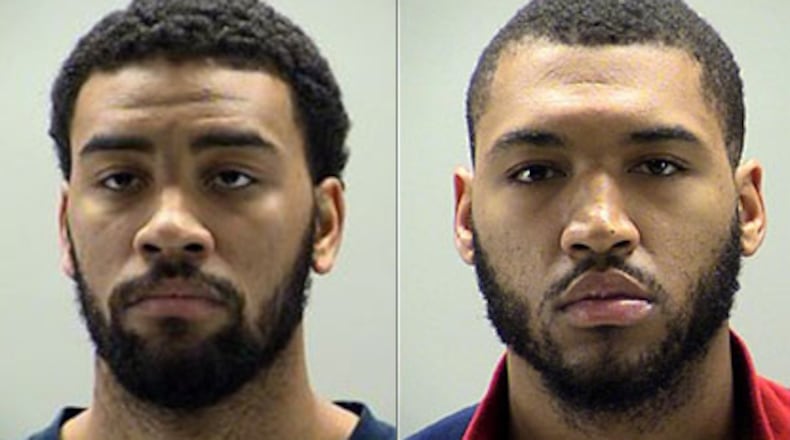The most recent investigation started in December, reports show, when 34 UD students either had money stolen from their dorm rooms or were in their rooms when men matching the descriptions of Devon Scott and Jalen Robinson walked into their rooms.
Fourteen students reported cash was stolen, totaling more than $500.
“You should lock your door,” one of the players reportedly replied when a female student started screaming at them after they walked in while she was in her dorm room bed.
Reports say their actions were caught on camera.
Robinson and Scott were kicked off the team in December and withdrew from the university.
Robinson is halfway through a 30-day jail sentence and owes restitution after pleading guilty to trespassing. Scott pleaded guilty last week to burglary and trespassing charges and faces three months in jail and restitution.
At least one female student who said $50 was missing from her wallet hesitated when UD police asked if she wanted to press charges.
“(She) said that no one wanted to be the one to get Scott ‘kicked off’ the basketball team because the University of Dayton is very ‘basketball oriented,’ ” the report says. “(She) expressed that she was afraid people would ‘hate her’ and there would be backlash for coming forward.”
“(The officers) told her that her position was certainly understandable,” the report says, noting that officers informed her counseling services were available through the university if needed.
UD: Equal treatment
UD spokeswoman Cilla Shindell said Wednesday that “we take care to deal with all students fairly and equally with no special treatment for any student.”
“The University takes student behavior that could involve potential criminal activity very seriously and investigates thoroughly,” she said.
Reports say Robinson returned one of the students’ money, then texted that student and asked him to help Robinson return other students’ money.
Frank LoMonte, executive director of the Student Press Law Center, said the nearly two months it took UD to hand over the records — coming after the criminal cases were nearly concluded — is not “a reasonable amount of time.”
“If it’s a record that the agency itself keeps readily at hand, then a reasonable amount of time is literally the amount of time it takes to reach into a drawer and hand it to you,” he said.
LoMonte said it’s vital for students and the public to have access to police records to make sure justice is carried out properly, especially in university systems where the administration has broad leeway to handle a case administratively instead of through the courts.
Before the high court ruling, cases that did not result in prosecution would create no records accessible to the public, sometimes feeding suspicion about how cases were handled.
Kavanaugh reports
One such high-profile case was the sexual assault allegation brought against former UD basketball center Matt Kavanaugh in 2012. Kavanaugh was not charged criminally but was suspended for a year for violating university policies before returning to help UD reach the Elite Eight in the 2014 NCAA tournament. He then graduated and played professionally in Europe.
The I-Team requested the investigation into this case, and on Wednesday received a 37-page report with all names and many details redacted, or blacked out. This newspaper’s attorney responded to UD with a letter disputing the redactions.
The report shows UD police spent a month investigating the allegations, which came from a freshman student who claimed she was held against her will until her assaulter passed out drunk.
UD police interviewed suspects, obtained DNA evidence, acquired text messages from the girl to her friend saying “I’m scared” and “This kid is tryna to rape me at Caldwell help me I’m serious.”
She told police she didn’t try to run or fight but was scared and kept saying she needed to leave, verbally denying his advances as he undressed her. The details of their physical interaction are blacked out.
The suspect in the case, whose name is redacted from the report, told police they were “kissing and ‘messing around’ ” and she agreed to go to his apartment.
“He said that he never kept her from leaving, and she never acted like she wanted to leave,” the report said.
Reports said the police department’s findings were handed over to the Montgomery County Prosecutor’s Office, which decided “no charges are being accepted since there is not enough evidence to prosecute.”
“I was advised that our case was thoroughly investigated and complete but that they did not feel that they could win this case in court,” the investigator wrote.
UD officials said the month-plus delay it took to provide these records after the Supreme Court’s decision was because the university for the first time had to create a system to comply with these types of public records requests.
“We are taking steps to comply with the law and ensure our procedures are in accordance with state and federal privacy laws,” Shindell said. “We will respond promptly to future requests within a reasonable period of time.”
About the Author

